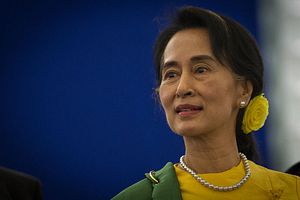Myanmar’s military administration has added five new corruption charges to the lengthy rap sheet facing Aung San Suu Kyi, the leader it ousted in last February’s coup d’etat. According to the Associated Press, these five additional charges are connected to the granting of permits involving “the hire, purchase, and maintenance of a helicopter.”
Aung San Suu Kyi, who has spent the last year under confinement at an unknown location in the capital Naypyidaw, is facing at least a dozen other charges. These include causing “fear and alarm,” violating COVID-19 protocols, and unspecified breaches of the colonial-era Official Secrets Act, as well as five other corruption charges, including her alleged illegal acceptance of $600,000 cash and 11 kilograms of gold from a political ally.
The five new corruption charges were foreshadowed by the state-run Global New Light of Myanmar, which reported last month that Aung San Suu Kyi and President Win Myint would both be charged with abusing their power and causing a loss of state funds after granting permission to another minister to rent and buy a helicopter.
Each of the five new charges is punishable by up to 15 years in prison and a fine. Aung San Suu Kyi, who since the coup has been held in an undisclosed location in the capital Naypyidaw, has already been sentenced to six years imprisonment, with a series of parallel trials ongoing.
On December 6, a special court in Naypyidaw sentenced the 76-year-old Nobel laureate to four years in prison after finding her guilty of incitement and violating coronavirus restrictions. (This was later halved to two years in an act of barbed magnanimity by Min Aung Hlaing.) Then, on January 10, she was sentenced to a further four years imprisonment for illegally importing and possessing walkie-talkie radios and violating COVID-19 restrictions.
The battery of charges is transparently designed to rule the popular Aung San Suu Kyi out of participation in Myanmar’s politics, ensure that the twilight of her career is eaten up by a rota of court hearings and house arrest, and provide a thin legal pretext for the military’s seizure of power in February.
“Min Aung Hlaing and the junta leaders obviously still view her as a paramount political threat who needs to be permanently neutralized,” Phil Robertson of the U.S.-based organization Human Rights Watch, said in a statement after Aung San Suu Kyi’s latest conviction. “Only that can explain the junta’s willingness to appear as global laughingstocks as they secure convictions in a kangaroo court on the flimsiest, politically motivated charges.”
Of course, the military’s charges will do nothing to quench the widespread popularity of Aung San Suu Kyi, nor her status as a living martyr of the struggle against military rule. Beyond that, the growing popular resistance to the military coup has led to a broadening and maturing of Myanmar’s democratic politics beyond the talismanic leader and her legacy. Even as an ageing Aung San Suu Kyi is forced out of active politics and enclosed once again in a new period of house arrest, the popular resistance shows no sign of fading.

































